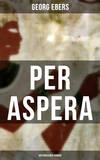Kitabı oku: «Homo Sum. Complete», sayfa 14
At the counter of the dealer of whom he had bought the woollen coverlet, the little jug, and many other things for Sirona, a priest had passed by, had pointed to his money, and had said, “Satan takes care of his own.”
Paulus had answered him nothing, had returned to his charge with an uplifted and grateful heart, and had heartily rejoiced once more in the exalted and encouraging consciousness that he was enduring disgrace and suffering for another in humble imitation of Christ. What was it then that made him so acutely sensitive with regard to Polykarp, and once more snapped those threads, which long years of self-denial had twined into fetters for his impatient spirit? Was it that to the man, who mortified his flesh in order to free his soul from its bonds it seemed a lighter matter to be contemned as a sinner, hated of God, than to let his person and his manly dignity be treated with contempt? Was he thinking of the fair listener in the cave, who was a witness to his humiliation? Had his wrath blazed up because he saw in Polykarp, not so much an exasperated fellow-believer, as merely a man who with bold scorn had put himself in the path of another man?
The lad and the gray-bearded athlete stood face to face like mortal enemies ready for the fight, and Polykarp did not waver, although he, like most Christian youths, had been forbidden to take part in the wrestling-games in the Palaestra, and though he knew that he had to deal with a strong and practised antagonist.
He himself was indeed no weakling, and his stormy indignation added to his desire to measure himself against the hated seducer.
“Come on—come on!” he cried; his eyes flashing, and leaning forward with his neck out-stretched and ready on his part for the struggle. “Grip hold! you were a gladiator, or something of the kind, before you put on that filthy dress that you might break into houses at night, and go unpunished. Make this sacred spot an arena, and if you succeed in making an end of me I will thank you, for what made life worth having to me, you have already ruined whether or no. Only come on. Or perhaps you think it easier to ruin the life of a woman than to measure your strength against her defender? Clutch hold, I say, clutch hold, or—”
“Or you will fall upon me,” said Paulus, whose arms had dropped by his side during the youth’s address. He spoke in a quite altered tone of indifference. “Throw yourself upon me, and do with me what you will; I will not prevent you. Here I shall stand, and I will not fight, for you have so far hit the truth—this holy place is not an arena. But the Gaulish lady belongs neither to you nor to me, and who gives you a claim—?”
“Who gives me a right over her?” interrupted Polykarp, stepping close up to his questioner with sparkling eyes. “He who permits the worshipper to speak of his God. Sirona is mine, as the sun and moon and stars are mine, because they shed a beautiful light on my murky path. My life is mine—and she was the life of my life, and therefore I say boldly, and would say, if there were twenty such as Phoebicius here, she belongs to me. And because I regarded her as my own, and so regard her still, I hate you and fling my scorn in your teeth—you are like a hungry sheep that has got into the gardener’s flower-bed, and stolen from the stem the wonderful, lovely flower that he has nurtured with care, and that only blooms once in a hundred years—like a cat that has sneaked into some marble hall, and that to satisfy its greed has strangled some rare and splendid bird that a traveller has brought from a distant land. But you! you hypocritical robber, who disregard your own body with beastly pride, and sacrifice it to low brutality—what should you know of the magic charm of beauty—that daughter of heaven, that can touch even thoughtless children, and before which the gods themselves do homage! I have a right to Sirona; for hide her where you will—or even if the centurion were to find her, and to fetter her to himself with chains and rivets of brass—still that which makes her the noblest work of the Most High—the image of her beauty—lives in no one, in no one as it lives in me. This hand has never even touched your victim—and yet God has given Sirona to no man as he has given her wholly to me, for to no man can she be what she is to me, and no man can love her as I do! She has the nature of an angel, and the heart of a child; she is without spot, and as pure as the diamond, or the swan’s breast, or the morning-dew in the bosom of a rose. And though she had let you into her house a thousand times, and though my father even, and my own mother, and every one, every one pointed at her and condemned her, I would never cease to believe in her purity. It is you who have brought her to shame; it is you—”
“I kept silence while all condemned her,” said Paulus with warmth, “for I believed that she was guilty, just as you believe that I am, just as every one that is bound by no ties of love is more ready to believe evil than good, Now I know, aye, know for certain, that we did the poor woman an injustice. If the splendor of the lovely dream, that you call Sirona, has been clouded by my fault—”
“Clouded? And by you?” laughed Polykarp. “Can the toad that plunges into the sea, cloud its shining blue, can the black bat that flits across the night, cloud the pure light of the full-moon?”
An emotion of rage again shot through the anchorite’s heart, but he was by this time on his guard against himself, and he only said bitterly, and with hardly-won composure:
“And how was it then with the flower, and with the bird, that were destroyed by beasts without understanding? I fancy you meant no absent third person by that beast, and yet now you declare that it is not within my power even to throw a shadow over your day-star! You see you contradict yourself in your anger, and the son of a wise man, who himself has not long since left the school of rhetoric, should try to avoid that. You might regard me with less hostility, for I will not offend you; nay, I will repay your evil words with good—perhaps the very best indeed that you ever heard in your life. Sirona is a worthy and innocent woman, and at the time when Phoebicius came out to seek her, I had never even set eyes upon her nor had my ears ever heard a word pass her lips.”
At these words Polykarp’s threatening manner changed, and feeling at once incapable of understanding the matter, and anxious to believe, he eagerly exclaimed:
“But yet the sheepskin was yours, and you let yourself be thrashed by Phoebicius without defending yourself.”
“So filthy an ape,” said Paulus, imitating Polykarp’s voice, “needs many blows, and that day I could not venture to defend myself because—because—But that is no concern of yours. You must subdue your curiosity for a few days longer, and then it may easily happen that the man whose very aspect makes you feel dirty—the bat, the toad—”
“Let that pass now,” cried Polykarp. “Perhaps the excitement which the sight of you stirred up in my bruised and wounded heart, led me to use unseemly language. Now, indeed, I see that your matted hair sits round a well featured countenance. Forgive my violent and unjust attack. I was beside myself, and I opened my whole soul to you, and now that you know how it is with me, once more I ask you, where is Sirona?”
Polykarp looked Paulus in the face with anxious and urgent entreaty, pointing to the dog as much as to say, “You must know, for here is the evidence.”
The Alexandrian hesitated to answer; he glanced by chance at the entrance of the cave, and seeing the gleam of Sirona’s white robe behind the palm-branches, he said to himself that if Polykarp lingered much longer, he could not fail to discover her—a consummation to be avoided.
There were many reasons which might have made him resolve to stand in the way of a meeting between the lady and the young man, but not one of them occurred to him, and though he did not even dream that a feeling akin to jealousy had begun to influence him, still he was conscious that it was his lively repugnance to seeing the two sink into each other’s arms before his very eyes, that prompted him to turn shortly round, to take up the body of the little dog, and to say to the enquirer:
“It is true, I do know where she is hiding, and when the time comes you shall know it too. Now I must bury the animal, and if you will you can help me.”
Without waiting for any objection on Polykarp’s part, he hurried from stone to stone up to the plateau on the precipitous edge of which he had first seen Sirona. The younger man followed him breathlessly, and only joined him when he had already begun to dig out the earth with his hands at the foot of a cliff. Polykarp was now standing close to the anchorite, and repeated his question with vehement eagerness, but Paulus did not look up from his work, and only said, digging faster and faster:
“Come to this place again to-morrow, and then it may perhaps be possible that I should tell you.”
“You think to put me off with that,” cried the lad. “Then you are mistaken in me, and if you cheat me with your honest-sounding words, I will—”
But he did not end his threat, for a clear longing cry distinctly broke the silence of the deserted mountain: “Polykarp—Polykarp.” It sounded nearer and nearer, and the words had a magic effect on him for whose ear they were intended.
With his head erect and trembling in every limb, the young man listened eagerly. Then he cried out, “It is her voice! I am coming, Sirona, I am coming.” And without paying any heed to the anchorite, he was on the point of hurrying off to meet her. But Paulus placed himself close in front of him, and said sternly: “You stay here.”
“Out of my way,” shouted Polykarp beside himself. “She is calling to me out of the hole where you are keeping her—you slanderer—you cowardly liar! Out of the way I say! You will not? Then defend yourself, you hideous toad, or I will tread you down, if my foot does not fear to be soiled with your poison.”
Up to this moment Paulus had stood before the young man with out-spread arms, motionless, but immovable as an oak-tree; now Polykarp first hit him. This blow shattered the anchorite’s patience, and, no longer master of himself, he exclaimed, “You shall answer to me for this!” and before a third and fourth call had come from Sirona’s lips, he had grasped the artist’s slender body, and with a mighty swing he flung him backwards over his own broad and powerful shoulders on to the stony ground.
After this mad act he stood over his victim with out-stretched legs, folded arms, and rolling eyes, as if rooted to the earth. He waited till Polykarp had picked himself up, and, without looking round, but pressing his hands to the back of his head, had tottered away like a drunken man.
Paulus looked after him till he disappeared over the cliff at the edge of the level ground; but he did not see how Polykarp fell senseless to the ground with a stifled cry, not far from the very spring whence his enemy had fetched the water to refresh Sirona’s parched lips.
CHAPTER XVI
“She will attract the attention of Damianus or Salathiel or one of the others up there,” thought Paulus as he heard Sirona’s call once more, and, following her voice, he went hastily and excitedly down the mountainside.
“We shall have peace for to-day at any rate from that audacious fellow,” muttered he to himself, “and perhaps to-morrow too, for his blue bruises will be a greeting from me. But how difficult it is to forget what we have once known! The grip, with which I flung him, I learned—how long ago?—from the chief-gymnast at Delphi. My marrow is not yet quite dried up, and that I will prove to the boy with these fists, if he comes back with three or four of the same mettle.”
But Paulus had not long to indulge in such wild thoughts, for on the way to the cave he met Sirona. “Where is Polykarp?” she called out from afar.
“I have sent him home,” he answered. “And he obeyed you?” she asked again.
“I gave him striking reasons for doing so,” he replied quickly.
“But he will return?”
“He has learned enough up here for to-day. We have now to think of your journey to Alexandria.”
“But it seems to me,” replied Sirona, blushing, “that I am safely hidden in your cave, and just now you yourself said—”
“I warned you against the dangers of the expedition,” interrupted Paulus. “But since that it has occurred to me that I know of a shelter, and of a safe protector for you. There, we are at home again. Now go into the cave, for very probably some one may have heard you calling, and if other anchorites were to discover you here, they would compel me to take you back to your husband.”
“I will go directly,” sighed Sirona, “but first explain to me—for I heard all that you said to each other—” and she colored, “how it happened that Phoebicius took Hermas’ sheepskin for yours, and why you let him beat you without giving any explanation.”
“Because my back is even broader than that great fellow’s,” replied the Alexandrian quickly. “I will tell you all about it in some quiet hour, perhaps on our journey to Klysma. Now go into the cave, or you may spoil everything. I know too what you lack most since you heard the fair words of the senator’s son.”
“Well—what?” asked Sirona.
“A mirror!” laughed Paulus.
“How much you are mistaken!” said Sirona; and she thought to herself, “The woman that Polykarp looks at as he does at me, does not need a mirror.”
An old Jewish merchant lived in the fishing-town on the western declivity of the mountain; he shipped the charcoal for Egypt, which was made in the valleys of the peninsula by burning the sajal acacia, and he had formerly supplied fuel for the drying-room of the papyrus-factory of Paulus’ father. He now had a business connection with his brother, and Paulus himself had had dealings with him. He was prudent and wealthy, and whenever he met the anchorite, he blamed him for his flight from the world, and implored him to put his hospitality to the test, and to command his resources and means as if they were his own.
This man was now to find a boat, and to provide the means of flight for Sirona. The longer Paulus thought it over, the more indispensable it seemed to him that he should himself accompany the Gaulish lady to Alexandria, and in his own person find her a safe shelter. He knew that he was free to dispose of his brother’s enormous fortune-half of which in fact was his—as though it were all his own, and he began to rejoice in his possessions for the first time for many years. Soon he was occupied in thinking of the furnishing of the house, which he intended to assign to the fair Sirona. At first he thought of a simple citizen’s dwelling, but by degrees he began to picture the house intended for her as fitted with shining gold, white and colored marble, many-colored Syrian carpets, nay even with vain works of the heathen, with statues, and a luxurious bath. In increasing unrest he wandered from rock to rock, and many times as he went up and down he paused in front of the cave where Sirona was. Once he saw her light robe, and its conspicuous gleam led him to the reflection, that it would be imprudent to conduct her to the humble fishing-village in that dress. If he meant to conceal her traces from the search of Phoebicius and Polykarp, he must first provide her with a simple dress, and a veil that should hide her shining hair and fair face, which even in the capital could find no match.
The Amalekite, from whom he had twice bought some goat’s-milk for her, lived in a but which Paulus could easily reach. He still possessed a few drachmas, and with these he could purchase what he needed from the wife and daughter of the goatherd. Although the sky was now covered with mist and a hot sweltering south-wind had risen, he prepared to start at once. The sun was no longer visible though its scorching heat could be felt, but Paulus paid no heed to this sign of an approaching storm.
Hastily, and with so little attention that he confused one object with another in the little store-cellar, he laid some bread, a knife, and some dates in front of the entrance to the cave, called out to his guest that he should soon return, and hurried at a rapid pace up the mountain.
Sirona answered him with a gentle word of farewell, and did not even look round after him, for she was glad to be alone, and so soon as the sound of his step had died away she gave herself up once more to the overwhelming torrent of new and deep feelings which had flooded her soul ever since she had heard Polykarp’s ardent hymn of love.
Paulus, in the last few hours, was Menander again, but the lonely woman in the cavern—the cause of this transformation—the wife of Phoebicius, had undergone an even greater change than he. She was still Sirona, and yet not Sirona.
When the anchorite had commanded her to retire into the cave she had obeyed him willingly, nay, she would have withdrawn even without his desire, and have sought for solitude; for she felt that something mighty, hitherto unknown to her, and incomprehensible even to herself, was passing in her soul, and that a nameless but potent something had grown up in her heart, had struggled free, and had found life and motion; a something that was strange, and yet precious to her, frightening, and yet sweet, a pain, and yet unspeakably delightful. An emotion such as she had never before known had mastered her, and she felt, since hearing Polykarp’s speech, as if a new and purer blood was flowing rapidly through her veins. Every nerve quivered like the leaves of the poplars in her former home when the wind blows down to meet the Rhone, and she found it difficult to follow what Paulus said, and still more so to find the right answer to his questions.
As soon as she was alone she sat down on her bed, rested her elbows on her knees, and her head in her hand, and the growing and surging flood of her passion broke out in an abundant stream of warm tears.
She had never wept so before; no anguish, no bitterness was infused into the sweet refreshing dew of those tears. Fair flowers of never dreamed of splendor and beauty blossomed in the heart of the weeping woman, and when at length her tears ceased, there was a great silence, but also a great glory within her and around her. She was like a man who has grown up in an under-ground-room, where no light of day can ever shine, and who at last is allowed to look at the blue heavens, at the splendor of the sun, at the myriad flowers and leaves in the green woods, and on the meadows.
She was wretched, and yet a happy woman.
“That is love!” were the words that her heart sang in triumph, and as her memory looked back on the admirers who had approached her in Arelas when she was still little more than a child, and afterwards in Rome, with tender words and looks, they all appeared like phantom forms carrying feeble tapers, whose light paled pitifully, for Polykarp had now come on the scene, bearing the very sun itself in his hands.
“They—and he,” she murmured to herself, and she beheld as it were a balance, and on one of the scales lay the homage which in her vain fancy she had so coveted. It was of no more weight than chaff, and its whole mass was like a heap of straw, which flew up as soon as Polykarp laid his love—a hundredweight of pure gold, in the other scale.
“And if all the nations and kings of the earth brought their treasures together,” thought she, “and laid them at my feet, they could not make me as rich as he has made me, and if all the stars were fused into one, the vast globe of light which they would form could not shine so brightly as the joy that fills my soul. Come now what may, I will never complain after that hour of delight.”
Then she thought over each of her former meetings with Polykarp, and remembered that he had never spoken to her of love. What must it not have cost him to control himself thus; and a great triumphant joy filled her heart at the thought that she was pure, and not unworthy of him, and an unutterable sense of gratitude rose up in her soul. The love she bore this man seemed to take wings, and it spread itself over the common life and aspect of the world, and rose to a spirit of devotion. With a deep sigh she raised her eyes and hands to heaven, and in her longing to prove her love to every living being, nay to every created thing, her spirit sought the mighty and beneficent Power to whom she owed such exalted happiness.
In her youth her father had kept her very strictly, but still he had allowed her to go through the streets of the town with her young companions, wreathed with flowers, and all dressed in their best, in the procession of maidens at the feast of Venus of Arelas, to whom all the women of her native town were wont to turn with prayers and sacrifices when their hearts were touched by love.
Now she tried to pray to Venus, but again and again the wanton jests of the men who were used to accompany the maidens came into her mind, and memories of how she herself had eagerly listened for the only too frequent cries of admiration, and had enticed the silent with a glance, or thanked the more clamorous with a smile. To-day certainly she had no mind for such sport, and she recollected the stern words which had fallen from Dorothea’s lips on the worship of Venus, when she had once told her how well the natives of Arelas knew how to keep their feasts.
And Polykarp, whose heart was nevertheless so full of love, he no doubt thought like his mother, and she pictured him as she had frequently seen him following his parents by the side of his sister Marthana—often hand in hand with her—as they went to church. The senator’s son had always had a kindly glance for her, excepting when he was one of this procession to the temple of the God of whom they said that He was love itself, and whose votaries indeed were not poor in love; for in Petrus’ house, if anywhere, all hearts were united by a tender affection. It then occurred to her that Paulus had just now advised her to turn to the crucified God of the Christians, who was full of an equal and divine love to all men. To him Polykarp also prayed—was praying perhaps this very hour; and if she now did the same her prayers would ascend together with his, and so she might be in some sort one with that beloved friend, from whom everything else conspired to part her.
She knelt down and folded her hands, as she had so often seen Christians do, and she reflected on the torments that the poor Man, who hung with pierced hands on the cross, had so meekly endured, though He suffered innocently; she felt the deepest pity for Him, and softly said to herself, as she raised her eyes to the low roof of her cave-dwelling:
“Thou poor good Son of God, Thou knowest what it is when all men condemn us unjustly, and surely, Thou canst understand when I say to Thee how sore my poor heart is! And they say too, that of all hearts Thine is the most loving, and so thou wilt know how it is that, in spite of all my misery, it still seems to me that I am a happy woman. The very breath of a God must be rapture, and that Thou too must have learned when they tortured and mocked Thee, for Thou halt suffered out of love. They say, that Thou wast wholly pure and perfectly sinless. Now I—I have committed many follies, but not a sin—a real sin—no, indeed, I have not; and Thou must know it, for Thou art a God, and knowest the past, and canst read hearts. And, indeed, I also would fain remain innocent, and yet how can that be when I cannot help being devoted to Polykarp, and yet I am another man’s wife. But am I indeed the true and lawful wife of that horrible wretch who sold me to another? He is as far from my heart—as far as if I had never seen him with these eyes. And yet—believe me—I wish him no ill, and I will be quite content, if only I need never go back to him.
“When I was a child, I was afraid of frogs; my brothers and sisters knew it, and once my brother Licinius laid a large one, that he had caught, on my bare neck. I started, and shuddered, and screamed out loud, for it was so hideously cold and damp—I cannot express it. And that is exactly how I have always felt since those days in Rome whenever Phoebicius touched me, and yet I dared not scream when he did.
“But Polykarp! oh! would that he were here, and might only grasp my hand. He said I was his own, and yet I have never encouraged him. But now! if a danger threatened him or a sorrow, and if by any means I could save him from it, indeed—indeed—though I never could bear pain well, and am afraid of death, I would let them nail me to a cross for him, as Thou wast crucified for us all.
“But then he must know that I had died for him, and if he looked into my dying eyes with his strange, deep gaze, I would tell him that it is to him that I owe a love so great that it is a thing altogether different and higher than any love I have ever before seen. And a feeling that is so far above all measure of what ordinary mortals experience, it seems to me, must be divine. Can such love be wrong? I know not; but Thou knowest, and Thou, whom they name the Good Shepherd, lead Thou us—each apart from the other, if it be best so for him—but yet, if it be possible, unite us once more, if it be only for one single hour. If only he could know that I am not wicked, and that poor Sirona would willingly belong to him, and to no other, then I would be ready to die. O Thou good, kind Shepherd, take me too into Thy flock, and guide me.”
Thus prayed Sirona, and before her fancy there floated the image of a lovely and loving youthful form; she had seen the original in the model for Polykarp’s noble work, and she had not forgotten the exquisite details of the face. It seemed to her as well known and familiar as if she had known—what in fact she could not even guess—that she herself had had some share in the success of the work.
The love which unites two hearts is like the ocean of Homer which encircles both halves of the earth. It flows and rolls on. Where shall we seek its source—here or there—who can tell?
It was Dame Dorothea who in her motherly pride had led the Gaulish lady into her son’s workshop. Sirona thought of her and her husband and her house, where over the door a motto was carved in the stone which she had seen every morning from her sleeping-room. She could not read Greek, but Polykarp’s sister, Marthana, had more than once told her what it meant. “Commit thy way to the Lord, and put thy trust in Him,” ran the inscription, and she repeated it to herself again and again, and then drew fancy-pictures of the future in smiling day-dreams, which by degrees assumed sharper outlines and brighter colors.
She saw herself united to Polykarp, and as the daughter of Petrus and Dorothea, at home in the senator’s house; she had a right now to the children who loved her, and who were so dear to her; she helped the deaconess in all her labors, and won praise, and looks of approval. She had learned to use her hands in her father’s house and now she could show what she could do; Polykarp even gazed at her with surprise and admiration, and said that she was as clever as she was beautiful, and promised to become a second Dorothea. She went with him into his workshop, and there arranged all the things that lay about in confusion, and dusted it, while he followed her every movement with his gaze, and at last stood before her, his arms wide—wide open to clasp her.
She started, and pressed her hands over her eyes, and flung herself loving and beloved on his breast, and would have thrown her arms round his neck, while her hot tears flowed—but the sweet vision was suddenly shattered, for a swift flash of light pierced the gloom of the cavern, and immediately after she heard the heavy roll of the thunder-clap, dulled by the rocky walls of her dwelling.
Completely recalled to actuality she listened for a moment, and then stepped to the entrance of the cave. It was already dusk, and heavy rain-drops were falling from the dark clouds which seemed to shroud the mountain peaks in a vast veil of black crape. Paulus was nowhere to be seen, but there stood the food he had prepared for her. She had eaten nothing since her breakfast, and she now tried to drink the milk, but it had curdled and was not fit to use; a small bit of bread and a few dates quite satisfied her.
As the lightning and thunder began to follow each other more and more quickly, and the darkness fast grew deeper, a great fear fell upon her; she pushed the food on one side, and looked up to the mountain where the peaks were now wholly veiled in night, now seemed afloat in a sea of flame, and more distinctly visible than by daylight. Again and again a forked flash like a saw-blade of fire cut through the black curtain of cloud with terrific swiftness, again and again the thunder sounded like a blast of trumpets through the silent wilderness, and multiplied itself, clattering, growling, roaring, and echoing from rock to rock. Light and sound at last seemed to be hurled from Heaven together, and the very rock in which her cave was formed quaked.
Crushed and trembling she drew back into the inmost depth of her rocky chamber, starting at each flash that illumined the darkness.
At length they occurred at longer intervals, the thunder lost its appalling fury, and as the wind drove the storm farther and farther to the southwards, at last it wholly died away.










